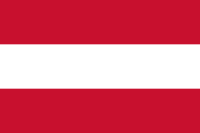 Austria /ˈɒstriə/ (help·info) or /ˈɔːstriə/ (German: Österreich (help·info)), officially the Republic of Austria(German: Republik Österreich), is a landlocked country of roughly 8.3 million people in Central Europe. It borders Germany and the Czech Republic to the north, Slovakia and Hungary to the east, Slovenia and Italy to the south, and Switzerland and Liechtenstein to the west. The territory of Austria covers 83,872 square kilometres (32,383 sq mi) and has a temperate and alpine climate. Austria’s terrain is highly mountainous due to the presence of the Alps; only 32% of the country is below 500 metres (1,640 ft), and its highest point is 3,797 metres (12,457 ft). The majority of the population speaks German, which is also the country’s official language. Other local official languages are Croatian, Hungarian and Slovene.
Austria /ˈɒstriə/ (help·info) or /ˈɔːstriə/ (German: Österreich (help·info)), officially the Republic of Austria(German: Republik Österreich), is a landlocked country of roughly 8.3 million people in Central Europe. It borders Germany and the Czech Republic to the north, Slovakia and Hungary to the east, Slovenia and Italy to the south, and Switzerland and Liechtenstein to the west. The territory of Austria covers 83,872 square kilometres (32,383 sq mi) and has a temperate and alpine climate. Austria’s terrain is highly mountainous due to the presence of the Alps; only 32% of the country is below 500 metres (1,640 ft), and its highest point is 3,797 metres (12,457 ft). The majority of the population speaks German, which is also the country’s official language. Other local official languages are Croatian, Hungarian and Slovene.
The origins of Austria date back to the time of the Roman Empire when a Celtic kingdom was conquered by the Romans in approximately 15 BC and later became Noricum, a Roman province, in the mid 1st century AD—an area which mostly encloses today’s Austria. In 788 AD, the Frankish king Charlemagne conquered the area and introduced Christianity. Under the native Habsburg dynasty, Austria became one of the great powers of Europe. In 1867, the Austrian Empire was reformed into Austria-Hungary.
The Austro-Hungarian Empire collapsed in 1918 with the end of World War I. The First Austrian Republic was established in 1919. In the 1938 Anschluss, Austria was occupied and annexed by Nazi Germany. This lasted until the end of World War II in 1945, after which Austria was occupied by the Allies and its former democratic constitution was restored. In 1955, the Austrian State Treaty re-established Austria as a sovereign state, ending the occupation. In the same year, the Austrian Parliament created the Declaration of Neutrality which declared that the country would become permanently neutral.
Today, Austria is a parliamentary representative democracy comprising nine federal states. The capital—and with a population exceeding 1.6 million, Austria’s largest city—is Vienna. Austria is one of the richest countries in the world, with a nominal per capita GDP of $43,570. The country has developed a high standard of living and in 2008 was ranked 14th in the world for its Human Development Index. Austria has been a member of the United Nations since 1955, joined the European Union in 1995, and is a founder of the OECD. Austria also signed the Schengen Agreement in 1995, and adopted the European currency, the euro, in 1999.
Austria’s past as a European power and its cultural environment have generated a broad contribution to various forms of art, most notably among them music. Austria has been the birthplace of many famous composers such as Joseph Haydn, Michael Haydn, Franz Schubert, Anton Bruckner, Johann Strauss, Sr. and Johann Strauss, Jr. as well as members of the Second Viennese School such as Arnold Schoenberg, Anton Webern and Alban Berg.Wolfgang Amadeus Mozart was born in Salzburg, then an independent Church Principality, though one that was culturally closely connected to Austria, and much of Mozart’s career was spent in Vienna.
Forestry, cattle raising, and dairying are prevalent throughout the alpine provinces; Vorarlberg has an ancient textile industry. About 3% of the population is employed in mostly small-scale agriculture; the country is nearly self-sufficient in terms of food production. In Upper and Lower Austria and in Burgenland, tillage agriculture predominates: the chief crops are potatoes, sugar beets, fruit, barley, rye, and oats.
Manufacturing is diversified and accounts for over 30% of the gross national product. More than half of the industries are concentrated in the Vienna basin; Linz, Steyr, Graz, Leoben, Innsbruck, and Salzburg are the other chief industrial centers. Many of the country’s industries were nationalized after World War II, together with the largest commercial banks. The chief manufactures are machinery, vehicles, iron and steel, communications equipment, chemicals, and paper and wood products. Food processing is also important, and many minerals necessary for industry (graphite, iron, magnesium, copper, zinc, and lignite) are found in Austria. The country also has deposits of crude oil and salt, and is rich in hydroelectric power. In recent years, service industries, including a large banking sector, have become important to Austria’s economy, and they now employ some 70% of the nation’s workforce. Tourism is also important. The main trading partners are Germany, Italy, Switzerland, and the United States.
Notes from Wikipedia and Answers.com









